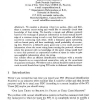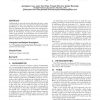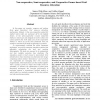723 search results - page 83 / 145 » Computationally Efficient Transductive Machines |
EUROCRYPT
1995
Springer
14 years 18 days ago
1995
Springer
We coiisider a situation where two parties, Alice and Bob, share a common secret string arid would like to mutually check their knowledge of that string. We describe a simple and e...
ICPR
2006
IEEE
14 years 10 months ago
2006
IEEE
Protein fold recognition has been the focus of computational biologists for many years. In order to map a protein primary structure to its correct 3D fold, we introduce in this pa...
SAMOS
2004
Springer
14 years 2 months ago
2004
Springer
Abstract. This paper presents some interesting concepts of static dataflow machines that can be used by reconfigurable computing architectures. We introduce some data-driven reconf...
SIGCOMM
2010
ACM
13 years 9 months ago
2010
ACM
Traditionally, in-network services like firewall, proxy, cache, and transcoders have been provided by dedicated hardware middleboxes. A recent trend has been to remove the middleb...
IPPS
2006
IEEE
14 years 3 months ago
2006
IEEE
In this paper we consider, compare and analyze three game theoretical Grid resource allocation mechanisms. Namely, 1) the non-cooperative sealed-bid method where tasks are auction...



